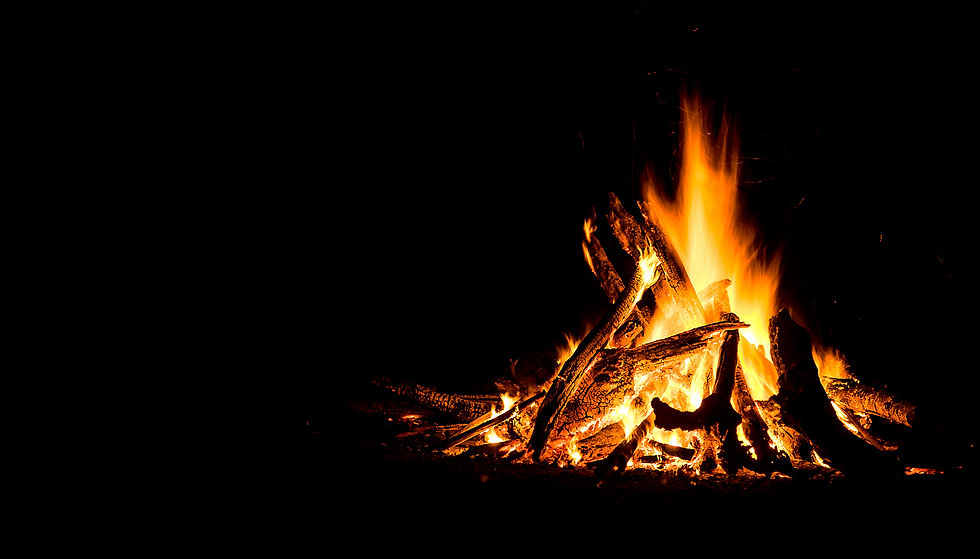Light The Fire
- MPS Coaches

- Jan 30, 2025
- 4 min read

The will to train is much like a bed of coals, or at least, that is a good way to think about it. A bed of coals is extremely versatile. As they are, they can be a decent source of warmth or a perfect place to cook from, but their real value lies in their rapid capacity for change. With the correct fuel, they can quickly spring into a full-fledged fire. Of course, a fire provides its own unique set of advantages and disadvantages. A fire puts out orders of magnitude more heat than a bed of coals, can signal your position in a time of desperate need, and it entraps us in its unpredictable spell. You know what I mean; we can just stare at a fire. It pulls us in.
And although a fire probably offers up more opportunity, particularly in its unique siren song (I haven’t known many people to just sit around a bed of coals and tell stories), its severe stipulation is an inordinate amount of fuel to keep it alive. The bigger the fire the more fuel needed. And so, it is much easier to extend the smolder of a coal into the future than it is the roar of a fire.
We tend to always communicate training as if it’s always the fire and never the coal; when training should mostly be the coal and sometimes the fire. Although this isn’t the central thesis to the message I am attempting to deliver, it is definitely the bedrock. We have to get this oriented properly first, otherwise we are doomed to fail. This message is always worth communicating because it is the fundamental principle for training longevity. And herein lies the key to the universe; you just need to keep training. You need to keep training. No matter the season of life, no matter how busy you get, no matter the new job, the sometimes unyielding stress of life that can batter you like an unrelenting hurricane; you must never stop training. I don’t think I need to explain the reasons as to why this is the case, and if I do, well that’s a different essay.
This is the context where this analogy of comparing the will to train as a coal and fire becomes firmly rooted; that is, the context of real life. Your life is not a controlled science experiment. Your day to day does not take place in a vacuum; one that dismisses the nature of the season of life you currently inhabit. As I alluded to, real life will inevitably become more stressful than we like, and sometimes border on overwhelming. It is during these kinds of seasons especially that training is better represented as the bed of coals. In practice, this could mean many things. Perhaps it’s less training days per week. A few less sets. Maybe it’s lowering the overall intensity of your training through using weights that don’t encroach upon your maximum capability. Existentially, what this means, however, is an acceptance of the reality that your current season of life isn’t conducive for hard, tough training. In turn, this means you aren’t in a position to make large amounts of progress; progress might still be made, but in much smaller amounts. In reference to our analogy, you don’t possess the fuel needed to keep a fire going, but what you can do is keep the bed of coals alive.
All onerous seasons do come to an end, however. And when the time is right, you must light the fire. When your future is much more predictable, when you feel healthy, when your financial situation is stable, when you feel like your reality is harmoniously in tune with your capability, then it might be time to light the fire.
In practice, this means good, hard training, and lots more of it: more volume, higher intensities, maybe a more thought out plan requiring a more disciplined execution. Existentially, what this means, and this is the central message of this essay, is that you are explicitly asking yourself to be more than you currently are. You aren’t hoping that your training is enough to make some progress given the circumstances. You aren’t just showing up to each training session trying to make it through. You are participating in training that demands more out of you and you are choosing to meet that training with an attitude and level of effort that demands more of you as well.
This is a practice that I find necessary as a part of the experience of training. Definitively, training is inextricably imbued with improving capacity and capability. You can’t really call what you are doing - training - if somehow and some way you aren’t getting better, but this is a given. What I truly aim to communicate is the voluntary choice to shoulder a training workload that supersedes the inevitable burdensome seasons of life as your primary stressor is a positive and necessary choice. Part of knowing who you are is knowing what you are capable of, and you don’t really know what you are capable of if you’ve never pushed the boundaries of what you are currently able to do. I refer to a quote from Socrates that perfectly embodies the essence of this essay…
“It is a shame for a man to grow old without seeing the beauty and strength of which his body is capable.”
If you really want to find out what you are capable of, at some point, light the fire.
Training is Fun.


Comments